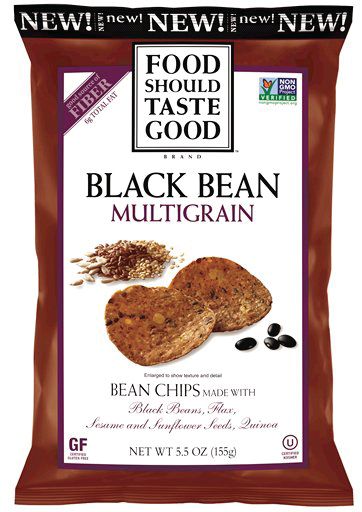Bean Snacks Are Trending
Plant protein and fiber intersect in bean snacks.
Photo courtesy of Food Should Taste Good

If you ask a group of elementary-school kids to name the magical fruit, it shouldn’t be long before they start shouting “beans!” at you. And while the famed legumes may not be fruits, or, strictly speaking, magical, many snack formulators are also getting excited about beans these days.
Vegetable snack alternatives to potato chips have been around for some time now, including kale, sweet potato, and beetroot chips. But new ingredients like beans are now taking center stage in a slew of new snack launches, according to Innova Market Insights.
“What we have noted more recently is a wider range of vegetables being applied (e.g. beans) for chips, and more development on the flavor/seasoning side,” says Lu Ann Williams, director of innovation for Innova Market Insights.
Take General Mills, which was inspired to add bean chips to its Food Should Taste Good line last June because “beans are one of those unique ingredients that seem to resonate with consumers,” says Stephen Crump, associate marketing manager, Food Should Taste Good. Food Should Taste Good’s bean chips are currently available in pinto and black bean multigrain flavors.
Saffron Road’s BeanStalks combines pinto beans, cannellini beans, and green peas.
Of course, nutritional value is a key selling point for bean chips, as “beans are one of the few ingredients that can deliver protein and fiber in a snack,” says Vincent James, senior vice president and general manager of snack division, Saffron Road. Saffron Road’s BeanStalks, a crunchy snack product that launched last year, combines pinto beans, cannellini beans, and green peas.
But if tapping into consumer demand for plant protein, fiber, and low-fat alternatives to potato chips isn’t enough for you, bean chip brands are also experimenting with an increasingly diverse range of flavors and designs. BeanStalks, for instance, are now available in sea salt, barbeque, and cheddar flavors.
Another bean chip brand, Beanfields Snacks, announced in late February it would be adding three new flavors to its line of bean and rice chips: jalapeño nacho, white bean with sea salt, and black bean with sea salt. Fashioned more like tortilla chips than potato chips, Beanfields’ new black bean chips were designed to stand out with a darker color, similar to the way blue corn tortilla chips are set apart from yellow corn tortilla chips.
Beanfields’ bean and rice chips are now available in vending machines and gas stations in some cities.
Distribution Challenges
It’s hard to argue with the novelty and nutritional appeal of bean snacks compared to potato or tortilla chips, but the more established snack types still have widespread consumer acceptance in their favor.
One of the biggest challenges facing an alternative vegetable chip brand is “finding shelf space in outlets where the traditional potato chip has ruled for so long,” suggests Innova’s Williams.
Nonetheless, bean snack brands are beginning to make inroads in mainstream distribution channels. Beyond health food stores and natural snack sections of conventional grocery stores, Beanfields’ bean chips are now available in airports, vending machines, convenience stores, and gas stations, especially in New York City and Los Angeles.
Saffron Road’s James also acknowledges that alternative snack brands face distribution challenges. But he says Saffron Road plans to expand distribution of its BeanStalks into convenience stores and corner markets in the next 12–18 months.
Beans may be one of the latest vegetable ingredients to arrive in snacks, but it likely won’t be the last. Innova’s Williams suggests that while many alternative snack ingredients have started out in niche products, the success of kale chips may “have opened doors for other vegetable varieties,” allowing products like bean chips to become popular. Which veggie snack ingredient will be next?
Prinova acquires Aplinova to further increase its footprint in Latin America
April 7th 2025Prinova has recently announced the acquisition of Brazilian ingredients distributor Aplinova, which is a provider of specialty ingredients for a range of market segments that include food, beverage, supplements, and personal care.














